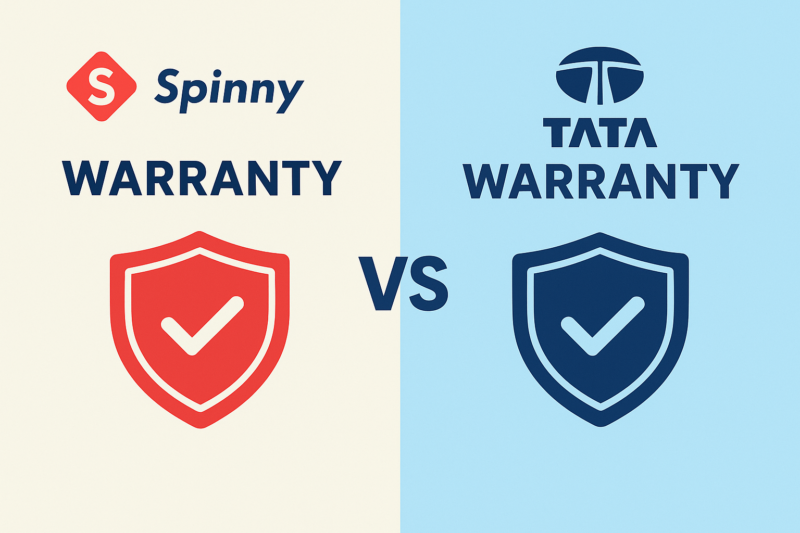While purchasing a new car, a very important step is checking eligibility for a car loan. Regardless of whether you’re looking to buy your first car or upgrade to a newer one, understanding the criteria helps to determine eligibility and can ease the overall application process. Moreover, it vastly improves your chances of approval.
Several factors influence eligibility for a car loan ranging from income, credit history, employment status, and age. By assessing these factors and understanding the requirements set by lenders, you can take the right steps to determine the likelihood of qualifying for a car loan and take the necessary steps to strengthen your application if necessary. Let’s take a look at the key factors involved while assessing eligibility for a car loan.
What Is Car Loan Eligibility?

Car Loan Eligibility is basically the criteria that lenders use to check whether an individual is qualified to receive a loan for purchasing a car. These criteria may vary among different lenders, but typically includes defining factors such as age, income, employment status, credit history, down payment, loan-to-value (LTV) ratio, employment stability and much more.
Its really important to review the specific eligibility criteria set by each lender before applying for a car loan. By understanding these factors and assessing your own financial situation, you can determine your likelihood of qualifying for a car loan and take steps to improve your eligibility if needed.
Why Is Eligibility Check Required For A Car Loan?
Car Loan Eligibility is a critical factor when applying for financing. Lenders will evaluate your application based on several factors, including your credit history and required documentation. Eligibility checks are necessary for a car loan due to these factors:
- Risk assessment:
Lenders need to assess the risk associated with lending money to borrowers. By evaluating the applicant’s eligibility based on factors such as income, credit history and employment status, lenders can determine the likelihood of timely payment. This helps them minimize the risk of default and financial losses.
- Compliance with regulations:
Financial institutions are often required to comply with regulatory requirements set by governing bodies. Conducting eligibility checks ensures that lenders adhere to these regulations, designed to protect consumers and maintain the stability of the financial system.
- Responsible Lending:
Eligibility checks help promote responsible lending practices. Lenders have to ensure that the borrowers can afford the loan they’re applying for without facing undue financial hardship. Assessing eligibility helps prevent borrowers from taking on more debt than they can reasonably repay, reducing the risk of default and financial distress.
- Fairness and Transparency:
Conducting eligibility checks ensure fairness and transparency in the lending process. By applying consistent criteria to all loan applicants, lenders can make informed decisions and treat customers fairly. This helps build trust and confidence in the lending institution and the overall financial system.
- Protection of lender’s assets:
Lenders use eligibility checks to protect their assets and investments. By ensuring that borrowers meet certain criteria such as having a stable income and good credit history, lenders can mitigate the risk of loan default and safeguard their financial interests.
Car Loan Eligibility Criteria For Leading Banks (as of March 2024)
State Bank of India
| Category | Minimum Income Criteria | Maximum Loan Amount | Age Criteria |
| Employees of central and state government, public sector undertakings (PSUs), private companies, reputed establishments | Rs. 3 lakh p.a. | 48 times of the net monthly income | 21 years to 70 years |
| Self-employed professionals, businessman, partnership/proprietary firms | Rs. 3 lakh p.a. | 4 times gross taxable income or net profit | 21 years to 70 years |
| Individuals involved in agricultural and allied activities | Rs. 4 lakh p.a. (can include co-applicant’s income) | 3 times of net annual income | 21 years to 70 years |
HDFC Bank
HDFC Bank Car Loan can be availed by the below-mentioned individuals/entities:
- Salaried individuals
- Self-employed sole proprietors
- Self-employed individuals/professionals at partnership firms
- Self-employed individuals/professionals who own private companies
- Self-employed individuals in public-limited companies including directors
| Category | Minimum Age | Maximum Age | Job/Business Stability | Minimum Annual Income | Other Criteria |
| Salaried Applicants | 21 years | 60 years | Should have worked continuously for 2 years and at least 1 year with the current employer | Rs. 3 lakh | Should have a post-paid mobile/telephone |
| Self-Employed Individuals/Professionals (Sole Proprietorship) | 21 years | 65 years | Should have been in the same line of business for at least 2 years | Rs. 3 lakh | N/A |
| Self-Employed Individuals/Professionals (Partnership Firms/Private Limited Companies/Public Limited Companies) | N/A | N/A | N/A | Rs 3 Lakh | This includes self-employed partners in the business of manufacturing, trading or services |
ICICI Bank
You can calculate your eligibility for a car loan from ICICI bank by using their ‘Car Loan Eligibility Calculator’ available on their official website. You will need to enter details such as your contact number, type of residence, type of employment, the car model you wish to purchase, ex-showroom price of the car etc., to calculate your eligibility.
| Category | Age Criteria | Income/Annual Turnover | Credit Score | Employment/Business Stability | Other Criteria |
| Salaried Individuals | 21 – 65 years | Meets minimum income threshold | Good credit history preferred | Permanent employment status preferred | N/A |
| Self-employed Individuals | 21 – 65 years | Demonstrates ability to repay the loan | Good credit history preferred | Stable income and business performance | Business documentation (Tax returns, business registration documents, etc.) |
| Self-employed Non-Individuals | N/A | Meets minimum turnover criteria | Demonstrates ability to repay the loan | Properly registered business entity | Business documentation (Audited financial statements, tax returns, etc.) |
| Priority/Wealth/Privee Customers | N/A | N/A | N/A | Maintained active account status with the bank | Long-standing relationship with the bank |
| Salary Customers | 21 – 65 years | Meets minimum income threshold | Good credit history preferred | Minimum employment duration required | N/A |
Axis Bank
| Category | Min Age | Max Age | MinAnnual Income | Employment/Business Status | Other Criteria |
| Salaried Individuals | 21 years | 60 years | Rs. 2.4 lakhs | Should be in continuous employment for at least one year | Should be able to produce Form 16 and latest salary slip to prove income eligibility Applicants holding salary account with Axis Bank since the last 3 months Applicants employed at MNCs, public and private limited companies, and permanent employees of state/central government/PSUs/reputed colleges/schools |
| Self-Employed Individuals | 18 years | 65 years | Rs. 1.8 lakh – 2 lakh | Should be in the same line of business for at least 3 years | Should be able to produce latest Income Tax returns to prove income eligibility |
IDFC Bank
| Category | Age Criteria | Employment/Business Status | Minimum Annual Income | Other Criteria |
| Other Criteria | 21 – 60 years | Minimum 3 years of experience | More than Rs. 1 lakh per year | Indian residents and NRIs can apply |
| Self-Employed | 23 – 70 years | Minimum 4 years in business | Rs. 1.5 lakhs per year | Residents who are Indians |
How To Improve Car Loan Eligibility
Some of the ways you can improve your car loan eligibility are:
- Improve Credit Score: Your credit score is one of the most important factors that is considered when you apply for a car loan. Ensure you pay all your bills on time so that your credit score is good. Having a good credit score will ensure that loans are provided at low interest rates.
- Co-Applicants: Adding a co-applicant ensures you have better chances of obtaining a car loan. Having a co-applicant will show that the loan can be repaid on time.
- Clear Existing Debts: Make sure all outstanding debts are cleared. The debt-to-income ratio will be high if all debts are cleared.
Summary
In all – this covers everything you need to know about the eligibility process while applying for a car loan in India. From car loan eligibility criteria to credit history, down payment, loan-to-value ratio and much more.
FAQs About Car Loan Eligibility
What is the minimum age requirement to apply for a car loan in India?
Most lenders require applicants to be at least 21 years old to qualify for a car loan. Some may have higher age requirements. Sometimes, it varies depending on the lender of your choice, so it is better to go through their specific requirements before applying for a car loan.
What is the minimum income required for a salaried individual to be eligible for a car loan?
The applicant must be working for at least 2 years and for at least 1 year at the present company. The applicant should be earning at least Rs. 2.5 lakh p.a. and this can include the income of the spouse. The minimum income requirement varies among lenders. Generally, lenders expect applicants to have a steady source of income that meets their specified minimum income criteria.
How does my credit score affect my car loan eligibility?
Your credit score is a crucial factor in determining your car loan eligibility. A higher credit score indicates a lower credit risk to lenders, making you more likely to qualify for a loan and potentially receive better loan terms, such as lower interest rates and so on. Make sure that you pay all your bills on time to ensure that your credit score is high.
Is a down payment required for a car loan in India?
While not always mandatory, having a down payment can improve your chances of approval and may lead to better loan terms. Lenders typically require a certain percentage of the car’s value as a down payment.
What documents are required to apply for a car loan in India?
Common documents required for a car loan application in India include proof of identity, address proof, income documents(such as salary slip or income tax returns), bank statements, and photographs. Lenders may have specific document requirements, so it is essential to check with the chosen lender.
How long does it take to get a car loan approved in India?
The time it takes to get approved for a car loan can vary depending on the lender and your individual circumstances. Some lenders offer instant or pre-approved car loans, while others might take several days to process and approve your application.



